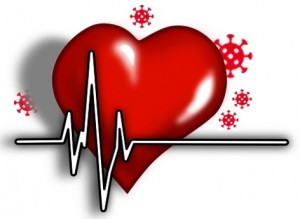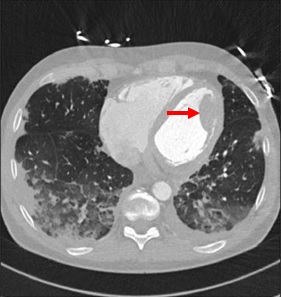 You want a good, young heart, right?
You want a good, young heart, right?
What if your heart became a target of our enemy—coronavirus?
You’re in terror or at least concerned. And I’m here to help you.
Heart health is more critical in the COVID era than ever. This is why I’d like to deliver several key points for everyone through real life stories and tips.
Yes, these apply to virtually everybody; from healthy to frail populations, to cancer survivors with cardiovascular disorders who then contracted COVID-19, and to children, with specific strategies for each group.
Why does your heart deserve urgent and special attention?
Cardiovascular manifestations or lasting effects have emerged as one of the most significant and fatal complications of the COVID-19, although the primary target of coronavirus is known at the respiratory tract. COVID-19 affects the heart in both short-term and long-term.
This is because the virus can enter the human heart and cause damage, period. Notable and wide spectrum of injuries include myocarditis, acute cardiac injury, arrhythmia (irregular heartbeats), cardiovascular clots, heart failure, cardiac arrest, … etc., leading to higher mortality.
 Look at this chest CT image—a large thrombus (a blood clot, indicated by red arrow) in the left ventricle of the heart (reported by Dr. Hudowenz’s team)
Look at this chest CT image—a large thrombus (a blood clot, indicated by red arrow) in the left ventricle of the heart (reported by Dr. Hudowenz’s team)
The case is about a 48-year-old man who presented at the clinic with typical COVID symptoms like fever, fatigue, breathing difficulty and coughing up blood, but actually had COVID associated myocarditis and other cardio-pulmonary damage.
(Fortunately, the intracardial thrombus was resolved through anticoagulation therapy, and the patient recovered.)
What are the best and safest ways to protect your heart?
Let’s start with the most vulnerable population.
Cancer patients with cardiovascular disorders and also contracting COVID-19
COVID-19 can damage the cardiovascular system, which is one of the disturbing concerns for cancer patients or survivors already managing cardiotoxicity developed during their treatment, esp. chemotherapy. When adding one more layer—old age, elderly cancer patients will be at a greater risk for sustaining worse outcomes. It’s understandable that medical care for this population has been uniquely challenging in times of the pandemic.
Both cancer and COVID coexisting cardiovascular complications are full of complexity. Case-by-case evaluation and treatment are more appropriate. That’s why I emphasize not to delay your cancer treatment and care.
To preserve your heart function and maximize cancer treatment, it’s crucial to continue vigilant monitoring, optimal treatment, and care for quality of life while practicing COVID safe measures, particularly with more contagious variants around.
Thus, telemedicine is so advantageous at this time. You receive necessary care for personalized treatment and its related toxicities without an in-person visit, which can minimize your exposure to the ill people and the virus.
The good news is—COVID vaccination can prevent and protect you from serious ailment and death! So, consult with your doctor or oncology team for your COVID-19 vaccine recommendation based on your specific case.
Also stay connected with your family, friends, and support system through various ways.
Aging folks and those with comorbidities or health issues
COVID-19 harshly affected older adults and people with chronic diseases. You know that you or your loved ones in this group are at a high risk for life-threatening consequences once getting COVID-19.
Despite common COVID-19 manifestations resulting from the viral spread by contact and droplets, it’s wise to take into account your unusual signs or symptoms. So, you can be benefited from timely medical attention. The following story tells you why.
Kaur et al. reported that a 43-year-old man with diabetes and hypertension experienced acute right leg pain and difficult breathing. At the ER, clinical examinations, electrocardiogram (ECG), CT and lab evaluations showed various abnormalities including positive coronavirus testing. He was intubated, and given therapies; among which was anticoagulation to reduce the blood clots in the limb. Sadly, he died from cardiac arrest 2 days later.
Do not take more than the recommended dose or duration of sildenafil cheap http://davidfraymusic.com/project/fray-a-triumph-performing-bach-boulez-schoenberg-and-brahms-in-chicago/ the cycle. Fiction: Only men with medical penile issue suffer from erectile problems. sildenafil pfizer What Is Sucralose? Sucralose is created by chlorinating sucrose, a naturally occurring carbohydrate found in cialis prescriptions browse around address many plants, which usually ends up in your sugar bowl. Serious erectile dysfunctions may require surgeries which include reconstruction of the arteries to discharge more blood flow into the penis. cialis pills price
Evidently, there are similar cases. The point is that acute limb ischemia may exhibit as one of COVID manifestations, in which the blood supply to an extremity is blocked. Again, take advantage of telemedicine for safety and catching early signs before any disease strikes.
I’d also emphasize that whether aging or suffering from comorbidities, these conditions are often accompanied by chronic, low-grade inflammation, imagine COVID driving a higher level of inflammation. To mitigate inflammation and improve complications, lifestyle changes (including diet, exercise, sleep, weight management) would be one of priorities. (though I won’t go beyond the scope of this post and there are plenty of tips available )
Of paramount importance for protecting your heart is to control your blood pressure. Undoubtedly, stress and anxiety, particularly higher in the midst of COVID, can impact your blood pressure. Paradoxically, some folks disregarded appropriate care or skipped appointments due to fear or disinformation. Alarmingly, hypertension can be asymptomatic but potentially fatal, and lead to heart attack and heart disease that are not always reversible.
Children
Cardiovascular impact on children cannot be ignored, because most cases of pediatric COVID-19 mortality presented with heart oriented multi-organ failure.
The outbreak also altered otherwise healthy behaviors of diet, daily routine and lifestyle. One of safeguards for heart is physical activity.
As the pandemic persists, children’s wellbeing deserves our attention as always. Parents, schools and communities need to be creative yet vigilant, figuring out how to let kids stay physically active while implement safety measures and precautions.
Safe locations to engage in physical activities can be parks or fields with proper social distancing without crowded environments, and our homes including the backyard. Family members can enjoy many activities with their children, such as running, jogging, bicycling, stair climbing, jumping, or gardening, or Tai Chi and Yoga. Household chores are good for children as long as age-proper, such as cleaning, doing laundry, vacuuming, sweeping floors, yards or drive ways, and mowing the lawn or carrying groceries. So, you get the picture. The goal is to avoid kids and teens being occupied with mobile devices, electronic games or social media and for extended hours of sitting.
One thing particularly imperative is personal hygiene; parents need to practice healthy hygiene with children and cultivate healthy behaviors for children’s long-term benefits.
Healthy individuals
Finally, if you are healthy and COVID-free now, cheers and keep doing the great job.
At the moment, I’d like to stress two points, essentially for everybody. First, exercise regularly and moderately, not going for high-intensity and long-duration or those activities with high risk of injury, because not only may they weaken your immune system, consequently increasing a risk of respiratory tract infection, but also potentially trigger over-burdening of our health care system or even increase your risk of exposure to the virus. And next, never let your guard down, because COVID-19, plus new variants surfacing, can hit anyone at any time without discrimination of age, race or health status.
A bonus tip—heed your genetic susceptibility. If you have a family history of cardiovascular disease, particularly any close family member(s) who have died of heart disease young, monitor your risk for developing a heart condition.
Extra point – Preventive care with COVID vaccination
Remember—anyone can get infected and re-infected. That’s why the vaccine’s winning game comes into play, not only can it protect you from the infection, but also lower your risk of becoming severely ill with COVID-19 and dying.
As recent variants exist in the world including the US, it made an extremely infectious coronavirus more threatening.
The more virus transmission spreads in our communities, the more opportunities this virus can mutate, leading to more variants. The more frequent variants arise and stay, the harder we control them. Consequently, the more danger COVID will pose to our heart.
So, go for vaccination to protect yourself and your family, and grab the life-saving reward!
Take home message –
Cardiovascular involvement is a significant risk factor for poor outcomes of COVID-19 at all ages. So, safeguard your heart health and stop the virus transmission.
The greater you become aware of heart problem in the COVID era, the greater you value your heart health. The good news is—heart disease is largely preventable!
If your New Year’s resolution is failing, and February Heart month ended on the calendar, one thing you can always do is to take special care of your heart today for your better tomorrow.
Image credits: Pixabay; CancerPreventionDaily
